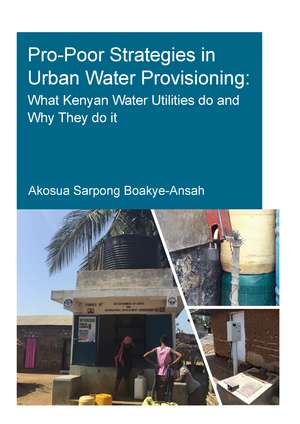Pro-Poor Strategies in Urban Water Provisioning: What Kenyan Water Utilities Do and Why They Do It: IHE Delft PhD Thesis Series
Autor Akosua Sarpong Boakye-Ansahen Limba Engleză Paperback – 24 dec 2020
Din seria IHE Delft PhD Thesis Series
-
 Preț: 355.20 lei
Preț: 355.20 lei - 23%
 Preț: 473.10 lei
Preț: 473.10 lei - 17%
 Preț: 257.23 lei
Preț: 257.23 lei - 28%
 Preț: 492.31 lei
Preț: 492.31 lei - 23%
 Preț: 472.25 lei
Preț: 472.25 lei - 13%
 Preț: 322.51 lei
Preț: 322.51 lei - 29%
 Preț: 524.35 lei
Preț: 524.35 lei - 31%
 Preț: 295.46 lei
Preț: 295.46 lei - 22%
 Preț: 399.88 lei
Preț: 399.88 lei - 30%
 Preț: 1015.76 lei
Preț: 1015.76 lei - 17%
 Preț: 268.83 lei
Preț: 268.83 lei - 44%
 Preț: 256.76 lei
Preț: 256.76 lei - 18%
 Preț: 254.47 lei
Preț: 254.47 lei - 25%
 Preț: 339.78 lei
Preț: 339.78 lei - 13%
 Preț: 322.01 lei
Preț: 322.01 lei - 26%
 Preț: 455.79 lei
Preț: 455.79 lei - 22%
 Preț: 399.48 lei
Preț: 399.48 lei - 27%
 Preț: 427.41 lei
Preț: 427.41 lei - 22%
 Preț: 371.52 lei
Preț: 371.52 lei - 26%
 Preț: 373.21 lei
Preț: 373.21 lei - 22%
 Preț: 328.64 lei
Preț: 328.64 lei - 13%
 Preț: 348.86 lei
Preț: 348.86 lei - 22%
 Preț: 369.82 lei
Preț: 369.82 lei - 18%
 Preț: 174.31 lei
Preț: 174.31 lei - 22%
 Preț: 414.78 lei
Preț: 414.78 lei - 23%
 Preț: 454.94 lei
Preț: 454.94 lei - 23%
 Preț: 315.45 lei
Preț: 315.45 lei - 17%
 Preț: 257.23 lei
Preț: 257.23 lei - 13%
 Preț: 296.68 lei
Preț: 296.68 lei - 22%
 Preț: 353.39 lei
Preț: 353.39 lei - 23%
 Preț: 326.95 lei
Preț: 326.95 lei - 13%
 Preț: 348.40 lei
Preț: 348.40 lei - 23%
 Preț: 367.30 lei
Preț: 367.30 lei - 22%
 Preț: 322.47 lei
Preț: 322.47 lei - 27%
 Preț: 425.74 lei
Preț: 425.74 lei - 17%
 Preț: 212.40 lei
Preț: 212.40 lei - 23%
 Preț: 473.94 lei
Preț: 473.94 lei - 13%
 Preț: 322.98 lei
Preț: 322.98 lei - 23%
 Preț: 367.73 lei
Preț: 367.73 lei - 22%
 Preț: 328.22 lei
Preț: 328.22 lei - 23%
 Preț: 350.43 lei
Preț: 350.43 lei - 25%
 Preț: 472.25 lei
Preț: 472.25 lei - 28%
 Preț: 498.58 lei
Preț: 498.58 lei - 23%
 Preț: 349.16 lei
Preț: 349.16 lei - 18%
 Preț: 162.13 lei
Preț: 162.13 lei - 13%
 Preț: 350.29 lei
Preț: 350.29 lei - 28%
 Preț: 550.16 lei
Preț: 550.16 lei - 25%
 Preț: 552.62 lei
Preț: 552.62 lei - 23%
 Preț: 384.59 lei
Preț: 384.59 lei - 18%
 Preț: 175.64 lei
Preț: 175.64 lei
Preț: 460.69 lei
Nou
Puncte Express: 691
Preț estimativ în valută:
88.15€ • 92.04$ • 72.96£
88.15€ • 92.04$ • 72.96£
Carte tipărită la comandă
Livrare economică 05-19 aprilie
Preluare comenzi: 021 569.72.76
Specificații
ISBN-13: 9780367705114
ISBN-10: 0367705117
Pagini: 152
Dimensiuni: 170 x 240 x 8 mm
Greutate: 0.25 kg
Ediția:1
Editura: CRC Press
Colecția CRC Press
Seria IHE Delft PhD Thesis Series
ISBN-10: 0367705117
Pagini: 152
Dimensiuni: 170 x 240 x 8 mm
Greutate: 0.25 kg
Ediția:1
Editura: CRC Press
Colecția CRC Press
Seria IHE Delft PhD Thesis Series
Public țintă
PostgraduateCuprins
Introduction, Literature review, Aligning Stakeholder Interests: How ‘Appropriate Technologies’ Have Become the Accepted Water Infrastructure Solutions for Low-Income Areas in Kenya, From Rowdy Cartels To Organized Ones? The Transfer of Power in Urban Water Supply in Kenya, The Pragmatism of Adopting Pre-Paid Water Dispensers: Insights from Two Kenyan Water Utilities, The Appropriateness of ‘Appropriate Technologies’ in Improving Access to Utility Water in Urban Low-Income Areas: Evidence from Kenya, Conclusion.
Notă biografică
Akosua Sarpong Boakye-Ansah holds a Bachelor’s degree in Laboratory Technology from the University of Cape-Coast, Ghana and a Master’s degree (cum laude) in Water Management from the IHE Delft Institute for Water Education (formerly UNESCO-IHE Delft Institute for Water Education). Between the periods of 2007 and 2015, she worked with the Ghana Water Company Limited (GWCL) first as Chemist/Bacteriologist in a Central Water Laboratory and then as a Process Chemist for the Barekese treatment works, in the Ashanti region of Ghana. In this capacity, she was responsible for the treatment of water and ensuring the overall quality of water treated on the plant.
In 2015, she started her PhD research with the Water Governance department of the IHE Delft Institute for Water Education. Her research formed part of the project, Performance Enhancement of Water Utilities in Kenya through benchmarking, collective learning and innovative financing (PEWAK). As a practitioner, she is experienced in drinking and wastewater treatment, water quality assessment and water distribution. As a researcher, she is interested in social, political, institutional and governance aspects of water services and has been involved in research in different countries including Ghana, Malawi and Kenya.
In 2015, she started her PhD research with the Water Governance department of the IHE Delft Institute for Water Education. Her research formed part of the project, Performance Enhancement of Water Utilities in Kenya through benchmarking, collective learning and innovative financing (PEWAK). As a practitioner, she is experienced in drinking and wastewater treatment, water quality assessment and water distribution. As a researcher, she is interested in social, political, institutional and governance aspects of water services and has been involved in research in different countries including Ghana, Malawi and Kenya.
Descriere
This book explores how water utilities mobilize pro-poor strategies to address the challenge of ensuring universal access in cities with rapidly expanding unplanned settlements. It goes beyond ideological discussions to examine actual water service provisioning practices, identifying with those responsible: water utilities.
